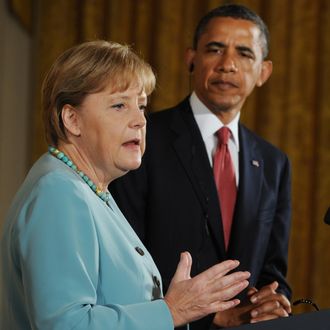
The Obama administration’s general response to Edward Snowden’s leaks has been to insist we’re all overreacting about the NSA spying on millions of people around the world, but German Chancellor Angela Merkel’s cell phone is proving to be the straw that broke the camel’s back. Supposedly the U.S. has stopped spying on Merkel, but on Monday, Sen. Dianne Feinstein, one of the NSA’s biggest defenders, said she thinks it’s a “big problem” that Obama reportedly didn’t authorize the targeting of world leaders. She added, “The White House has informed me that collection on our allies will not continue, which I support.” Feinstein might have jumped the gun, but administration and congressional sources tell the New York Times that Obama is poised to issue a ban on spying on the leaders of American allies.
In a six-paragraph statement, Feinstein explained that “Unlike NSA’s collection of phone records under a court order,” she feels that the Senate Intelligence Committee, which she chairs, was “not satisfactorily informed” of the NSA’s eavesdropping on foreign leaders. “Unless the United States is engaged in hostilities against a country or there is an emergency need for this type of surveillance, I do not believe the United States should be collecting phone calls or emails of friendly presidents and prime ministers,” she said, adding that such programs should require presidential approval. As a result, her committee will launch “a major review into all intelligence collection programs.”
The White House said no final decision has been made, and the Times notes that while Germany clearly falls into the “ally” category, categorizing a country like Egypt would prove far more difficult. But regardless of how the administration proceeds, losing Feinstein’s backing is a bad sign. “We’re really screwed now,” one NSA official told Foreign Policy. “You know things are bad when the few friends you’ve got disappear without a trace in the dead of night and leave no forwarding address.”
Even worse, the NSA itself may be turning on the White House. On Sunday, anonymous officials told The Wall Street Journal that President Obama didn’t even know the NSA was spying on friendly foreign leaders until this summer, and he immediately put a stop to it (or some of it, at least). On Monday, the Washington Post published a similar item, but several hours later the Los Angeles Times reported that current and former U.S. intelligence officials are insisting the White House and State Department signed off on the eavesdropping programs. Obama might not have been briefed specifically on operations targeting foreign allies, “But certainly the National Security Council and senior people across the intelligence community knew exactly what was going on, and to suggest otherwise is ridiculous,” said one official.
“People are furious,” another senior intelligence official said. “This is officially the White House cutting off the intelligence community.” But, you know, the NSA just runs a sophisticated operation seemingly capable of spying on every man, woman, and child around the planet. What are they going to do?






























